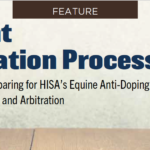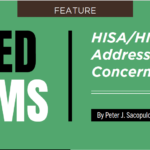Peter J. Sacopulos
The sale, purchase, claiming or lease of a mare, stallion or racehorse demands many considerations including the health, soundness, confirmation and analysis of bloodlines for future breeding. All are important; but one consideration that is often overlooked is the impact of sale and use taxes that may affect these decisions. This article will examine and analyze the rules governing Indiana and Illinois sale and use taxes relative to the sale, purchase, claiming and leasing of mares, stallions, and racehorses.
State sales tax is the tax imposed on the sale of tangible personal property. Sales tax is paid by the purchaser and collected by the seller. Thereafter, the amount collected is paid by the seller to the state in which the transaction took place. This seems straightforward. However, Indiana and Illinois, like many other states, exempt or exclude sales tax on the sale of horses for certain specific purposes.
For example, assume an owner of a brood mare sells, either at private sale or auction, the horse or, alternatively, the owner of a stallion, sells to a buyer a stud that is intended to stand for breeding purposes at the buyers facility. Do these transactions require the seller to collect and the buyer to pay sales tax? The laws governing sales tax in both Indiana and Illinois require the seller to collect and the buyer to pay sales tax when there is a sale of tangible personal property. As a general rule, the sale or purchase of items, such as a horse are subject to sales tax. However, under Illinois’ state tax laws neither the sale of the mare nor the purchase of the stallion would be subject to sales tax. This is because Illinois has an exemption for such purchases and sales. Specifically, Illinois exempts, from sales tax the receipt and sales of horses, or interest in horses, registered with and meeting the requirements of the Arabian Horse Club Registry of America, The Appaloosa Horse Club, American Quarter Horse Association, United States Trotting Association, or Jockey Club, as appropriate, used for the purpose of breeding or racing for prizes. Such transactions are also not subject to the Illinois Retailer’s Occupation Tax. (See 120 ILCS 2-5(27) and 86 Illinois Administrative Code 130.120(11). Illinois also recognizes an exemption from the Retailers Occupation Tax Act for producers of breeding livestock, gross receipts realized from the sale bulls, stallions or other servicing animals for breeding purposes. (See 86 Illinois Administrative Code 130.2100(d). The laws governing sales tax in the state of Indiana result in a different outcome. In Indiana the sale of the mare and the purchase of the stallion require the payment and collection of sales tax pursuant to Indiana Code 26-2.5 et. al. The only exception to the sales tax rule in Indiana, relative to these transactions, is when the purchaser of the tangible property (the mare or stallion) purchasing the same for resale or if the animal is being sold to a tax exempt entity.
Alternatively, what happens if the horse is “sold” via a claiming race. Sales tax or no sales tax? Absent an exception, claiming a horse in a claiming race constitutes the sale of a tangible personal property and, therefore, the transaction is subject to sales tax. Under Illinois law, the transaction/claiming would fit the exemption and no sales tax would be owed. However, a horse claimed in the state of Indiana would be subject to sales tax, absent one of the exceptions identified above.
Use tax operates as a compliment to sales tax. Use tax is often charged on the storage, use, or consumption of tangible personal property upon which no sales tax was paid to the state. The owner of the personal property, in this case a horse that is leased is responsible for the payment of a use tax absent an exemption. Use tax also seems straightforward. For example, if one leases or uses the tangible personal property of another, he/she must pay use tax. However, Indiana and Illinois laws governing use tax exempt certain equine transactions.
Is use tax due? The answer is, if a lessee is guaranteed, at the time a lease is entered into, the leased horse will be sold to the lessee, then that transaction is considered to be a conditional sale at the outset of the transaction. All receipts received by a lessor/retailer/seller under a conditional sales contract are subject, under Illinois law, to the Retailer’s Occupation Tax (86 Illinois Administrative Code 130.2010). Those who purchase items for resale under conditional sales contract should provide to the seller a certificate of resale that contains all the information set forth in (86 Illinois Administrative Code 130.1405).
In contrast to a conditional sale, a lessor of tangible personal property under a true lease in Illinois is deemed an end user of the property to be leased. (See Ill. Administrative Code 130.220). As an end user of tangible personal property located in the state of Illinois, the lessor owes use tax on the cost price of the property/horse. The lessor would remit the tax directly to the Illinois Department of Revenue. If the lessor has already paid tax in another state with respect to the acquisition of the horse, he/she would be exempt from use tax to the extent of the amount such tax properly due and paid in the other state. (86 Illinois Administrative Code 150.310(a)(3)). It should be noted that a true lease agreement generally has no buyout provision at the close of the lease. If a buyout provision does exist, there must be a fair market value buyout option in order that the transaction maintain the character of a true lease. The analysis regarding use tax the same under Indiana law; the lessor owes use tax.
In analyzing equine transactions from a sales or use tax prospective, it is also important to note that Indiana sales tax is 7% and Illinois sales tax is 6.25%. The use tax rate in the state of Indiana is 7% and the corresponding use tax rate in Illinois is 6.25%. As with all state and federal taxes, penalties and interest are assessed if due amounts are not timely paid. This article has focused on sales and use tax involving the sale, purchase, claiming and leasing of horses in Indiana and Illinois. However, race horses, brood mares and stallions are often purchased and used in multiple states. This often results in a patch work of differing state sales and use tax rules and potentially creates multiple sales and use tax exposures. As such, the best practice is to consult a professional tax or legal advisor for your specific situation.
This work is copyrighted and is the exclusive property of the author. It may only be used, in whole or in part, with the express written permission of the author.





